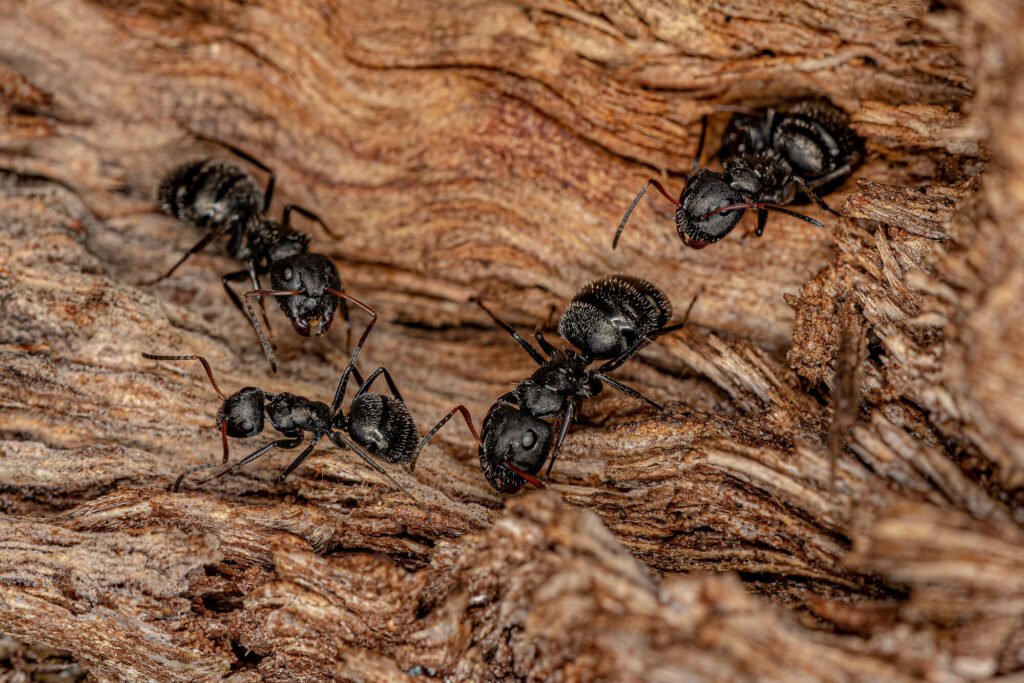Carpenter Ant Identification & Prevention
What You Need To Know About Carpenter Ants In Baltimore
Carpenter ants are among the most problematic ants to find their way into our Baltimore homes. Learning about carpenter ants, what they look like, the damage they can cause, and how to keep them at bay is key to guarding your home against these pests. Use this guide to better understand these common household pests.

Frequently Asked Questions About Carpenter Ants
What are carpenter ants?
Like other species of ants, carpenter ants are social and live together in highly organized colonies. Each colony contains queens, males, and infertile female workers. Workers are the most numerous members of the colony and are most likely to be seen around your yard and home. Workers grow between ¼ and ½ an inch long and are usually red, brown, or black.
The only time homeowners usually come into contact with the larger males and queens is the spring or summer when the winged reproductive members swarm from mature colonies to find a mate and create a new nest and colony.
Carpenter ants are a type of wood-destroying pest; though they are commonly likened to termites, they are two very different species of insects. People rarely see termites, while carpenter ants forage for food in broad daylight. Also, termites feed on the food they are tunneling through; carpenter ants do not eat wood. They use pieces of wood as nesting sites.
Are carpenter ants dangerous?
Carpenter ants in your Baltimore home are a danger to its structure. While their nesting habits won’t cause structural damage overnight, a carpenter ant infestation left untreated will eventually cause the need for costly repairs. Once carpenter ants establish themselves in damp wood in your home, they often extend their nests into sound wood, causing even more damage.
Because carpenter ants are attracted to moisture and water-damaged pieces of wood, their presence in your home indicates a moisture issue. Excess humidity in your home will not only attract pests like carpenter ants but cause mold, mildew, and other health concerns.
Why do I have a carpenter ant problem?
Carpenter ants are omnivores and can eat most of the same sweets, proteins, and carbohydrates that we eat. Our properties offer them the reliable food sources they use to sustain their colony. Some of the places homeowners regularly spot trails of carpenter ants are gardens, trashcans, recycling bins, and outdoor eating areas. Carpenter ants also feast on pet food and sweet liquids in hummingbird feeders.
Once ants find an appropriate food source, they will keep returning and lay down pheromone trails to alert their other colony members. Their ability to communicate allows a small ant problem to grow into a big problem in the blink of an eye!
Where will I find carpenter ants?
The carpenter ant is an eco-important insect; their nesting habits help in the decomposition of dead and decaying wood. Some of their more common outdoor nesting sites include logs, stumps, and dead or fallen trees.
When nesting outside near homes and other structures, they often enter inside, foraging for food. As they travel in and out of your home, if they discover damp wood, they may decide to stay and create a satellite nest to help expand their colony. Structural wood found around pipes, sinks, tubs, windows, and doors is most prone to damage by carpenter ants.
How do I get rid of carpenter ants?
For help removing destructive carpenter ants from your Baltimore property, trust the experts at ATC Pest Control. Our team of experts is dedicated to our customers, and we offer tailored services to meet your family’s and home’s unique needs. Our full-service pest control solutions in Baltimore will provide inspections, treatments, and follow-up visits necessary to remove and keep away for good from your home carpenter ants and other unwanted pests. Always remember that when quality counts, count on us! For information about carpenter ant control in Baltimore, trust ATC Pest Control.
How do I get rid of carpenter ants?
Use the following tips to help keep these unwanted “carpenters” from remodeling your home:
- Remove potential nesting sites from your yard like tree stumps, fallen trees, woodpiles, and decaying wooden structures.
- Eliminate potential foraging sites by keeping lids on trashcans, maintaining gardens, and picking up your pet’s uneaten food.
- Repair potential sources of moisture such as leaky hoses, pipes, and spigots.
- Remove any wood damaged by water from in or on your home.
- Seal gaps and cracks in your home’s exterior that can allow carpenter ants to move into your home.
To get rid of carpenter ants from your property, call us today to learn more about our residential and commercial pest control services in Baltimore.
Schedule Your Inspection
Complete the form below to schedule your no obligation inspection



